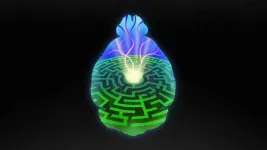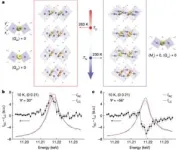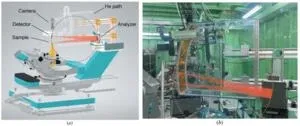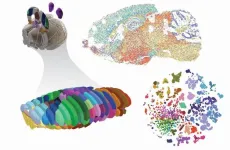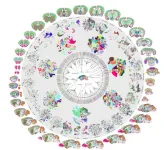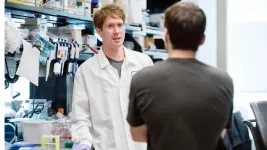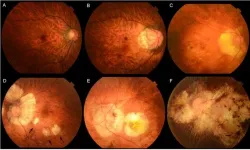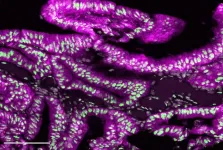(Press-News.org) By Jake Siegel
Imagine you’re teaching a dog to play fetch. You throw a ball, and your dog sprints after it, picks it up, and runs back. You then reward your panting pup with a treat. But now comes the real trick for your dog: figuring out which part of that sequence earned the treat. Scientists call this the 'credit assignment problem' in the brain. It's a fundamental question about understanding which actions are responsible for the positive outcomes we experience.
Dopamine, a key chemical messenger in the brain, is known to play a crucial role in this process. But exactly how the brain links specific actions to dopamine’s release has remained unclear.
A study published today in Nature by scientists at the Allen Institute, Columbia University’s Zuckerman Mind Brain Behavior Institute, the Champalimaud Centre for the Unknown and Seattle Children’s Research Institute sheds new light on this mystery. It reveals how dopamine not only signals a reward but also guides animals to home in on the specific behaviors that lead to these rewards through trial and error.
Intriguingly, the research also shows that the brain's reward system can swiftly and dynamically alter the full range of an animal’s movements and behaviors. This highlights a sophisticated learning strategy where behaviors are not just reinforced, but actively shaped and fine-tuned through experience, said Rui Costa, D.V.M, Ph.D. , the study’s senior author.
"When you reinforce behavior, we often think it's just that action,” said Costa, the president and CEO of the Allen Institute. “But no: you're changing the entire behavioral structure. And what was really surprising was how rapid it was."
Decoding how dopamine shapes learning
To uncover those insights, the team collaborated with engineers and neuroscientists at the Champalimaud Centre for the Unknown to develop a novel “closed loop” system that could link specific actions by mice to real-time dopamine release. The researchers outfitted mice with wireless sensors to track their movements within a simple controlled space. They then fed this data into a machine learning algorithm, which categorized these actions into distinct groups. The researchers then used optogenetics, a method for controlling neurons with light, to stimulate dopamine neurons once the mice performed predefined “target actions.”
They found that mice swiftly changed their behavior in response to dopamine release. Initially, they not only increased the frequency of the target action, but also of similar actions and those that occurred a few seconds before the dopamine release. Meanwhile, actions dissimilar to the target rapidly decreased. Over time, this refinement became more precise, with the mice increasingly focusing on the exact action that led to dopamine release.
The study also examined how mice learn a series of actions, unveiling a key process similar to rewinding time to understand what leads to a reward. When actions triggering dopamine occurred further apart, the mice learned more slowly. This shows that longer waits between actions make it harder for mice to connect the sequence with the reward. In essence, actions right before the reward are quickly grasped and improved upon, while earlier actions are refined more gradually. This ‘rewinding’ process strengthens the behavior and helps the mice progressively identify which precise actions and sequences yield the reward.
The findings could impact diverse fields like education and artificial intelligence (AI), said lead author Jonathan Tang, Ph.D. , an assistant professor at University of Washington Medicine – Pediatrics, Seattle Children’s Research Institute. For example, allowing for exploration, mistakes, and gradual refinement in the classroom may be more in line with our brain's innate learning processes.
In AI, the insights could lead to more sophisticated and efficient learning systems. By better replicating biological learning processes, we could create AI that is better at adapting to new data and situations.
This study offers deeper insight into how our brains learn and adapt through trial and error—whether you’re a scientist or a pup.
“We take a lot of stuff for granted about how things work, including credit assignment,” said Tang, who started the research with Costa while at Columbia University. “But it’s when you really start diving in that you realize the complexity. This is why people do science: to home in on the truth of the matter.”
About the Allen Institute
The Allen Institute is an independent, 501(c)(3) nonprofit research organization founded by philanthropist and visionary, the late Paul G. Allen. The Allen Institute is dedicated to answering some of the biggest questions in bioscience and accelerating research worldwide. The Institute is a recognized leader in large-scale research with a commitment to an open science model. Its research institutes and programs include the Allen Institute for Brain Science, launched in 2003; the Allen Institute for Cell Science, launched in 2014; the Allen Institute for Immunology, launched in 2018; and the Allen Institute for Neural Dynamics, launched in 2021. In 2016, the Allen Institute expanded its reach with the launch of The Paul G. Allen Frontiers Group, which identifies pioneers with new ideas to expand the boundaries of knowledge and make the world better. For more information, visit alleninstitute.org.
###
Media Contact
Peter Kim, Sr. Manager, Media Relations
peter.kim@alleninstitute.org
END
LA JOLLA (December 14, 2023)—Salk Institute researchers, as part of a worldwide initiative to revolutionize scientists’ understanding of the brain, analyzed more than 2 million brain cells from mice to assemble the most complete atlas ever of the mouse brain. Their work, published December 14, 2023 in a special issue of Nature, not only details the thousands of cell types present in the brain but also how those cells connect and the genes and regulatory programs that are active in each cell.
The efforts were coordinated by the National Institutes of Health’s Brain Research Through Advancing Innovative Neurotechnologies® Initiative, or the BRAIN Initiative®, ...
By Jake Siegel
Six years and 32 million cells later, scientists have created the first full cellular map of a mammalian brain. In a set of 10 papers in Nature today, a network of researchers unveiled an atlas cataloging the location and type of every cell in the adult mouse brain. Using advanced technologies that profile individual cells, the teams identified over 5,300 cell types – far more than known before – and pinpointed their locations within the brain’s intricate geography. ...
SAN FRANCISCO—December 13, 2023—In a study of historic scale, scientists at Gladstone Institutes have created an intricate map of how the immune system functions, examining the detailed molecular structures governing human T cells using the next-generation CRISPR tool known as base editing.
Their findings, published in Nature, uncover detailed information that could help overcome the limitations of today’s immunotherapies and identify new drug targets for a wide range of diseases, including autoimmune diseases and cancer.
Led by Gladstone Senior Investigator Alex Marson, MD, PhD, the team dove deep into the DNA of T cells, pinpointing ...
Liquid crystal is a state of matter that exhibits properties of both liquid and solid. It can flow like a liquid, while its constituent molecules are aligned as in a solid. The liquid crystal is widely used nowadays, for example, as a core element of LCD devices. The magnetic analog of this kind of material is dubbed the “spin-nematic phase”, where spin moments play the role of the molecules. However, it has not yet been directly observed despite its prediction a half-century ago. The main challenge stems ...
COLUMBUS, Ohio – Scientists have revealed a never-before-seen phenomenon in a protein: Alone, the enzyme processes DNA and RNA but, when bound to another protein as part of a defense system, interacts with a completely different type of compound to help bacteria commit suicide.
The finding came about as the researchers focused on detailing how this defense mechanism works in bacteria that are infected by phages, viruses that invade and make copies of themselves inside bacterial cells. In addition to detailing the proteins’ structures and binding sites, the experiments unearthed ...
Researchers from Tokyo Medical and Dental University (TMDU) develop models based on machine learning that predict long-term visual acuity in patients with high myopia, one of the top three causes of irreversible blindness in many regions of the world
Tokyo, Japan – Machine learning has been found to predict well the outcomes of many health conditions. Now, researchers from Japan have found a way to predict whether people with severe shortsightedness will have good or bad vision in the future.
In a study recently published in ...
For the first time ever, an international team of researchers has created a complete cell atlas of a whole mammalian brain. This atlas serves as a map for the mouse brain, describing the type, location, and molecular information of more than 32 million cells and providing information on connectivity between these cells. The mouse is the most commonly used vertebrate experimental model in neuroscience research, and this cellular map paves the way for a greater understanding of the human brain—arguably the most powerful computer in the world. The cell atlas also lays the foundation for the development of a new generation of precision therapeutics for people ...
Hard-to-detect colorectal pre-cancerous lesions known as serrated polyps, and the aggressive tumors that develop from them, depend heavily on the ramped-up production of cholesterol, according to a preclinical study from researchers at Weill Cornell Medicine. The finding points to the possibility of using cholesterol-lowering drugs to prevent or treat such tumors.
In the study, published Oct. 13 in Nature Communications, the researchers analyzed mice that develop serrated polyps and tumors, detailing the chain of molecular events in these tissues that leads to increased cholesterol production.
They ...
WASHINGTON, DC, 2023 – Recent U.S. wildfire events -- including the 2023 Maui wildfire in Hawaii, the 2022 Hermit’s Peak/Calf Canyon fire in New Mexico, and the 2020 Cameron Peak Fire in Colorado -- are tragic examples of how disadvantaged communities can suffer most during and after a wildfire. While all three fires had a devastating impact on an entire community, they disproportionately affected low-income populations who were left without adequate insurance or the financial means to rebuild their homes.
To study inequities in U.S. wildfire management, ...
COLUMBUS, Ohio – Parents who drank alcohol while watching the Super Bowl were more likely than those who abstained to use aggressive discipline on their children during the game, a new study shows.
Most of the parents in the study – more than 90% - were mothers, which is significant, said Bridget Freisthler, lead author of the study and professor of social work at The Ohio State University.
“The links between alcohol use, aggression and watching violent sports have been studied almost exclusively among ...
